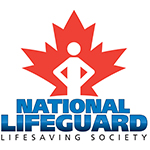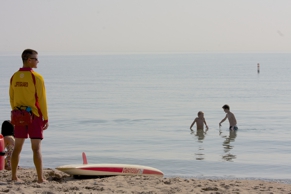
Canada's only nationally recognized lifeguard certification
program
Lifeguarding is an exciting and rewarding job that carries great
responsibility. Guards take courses and train hard for events they
hope will never happen and which they work hard to prevent.

NLS guards are always in training to keep their skills,
knowledge and fitness sharp. They are required to keep other
important certifications such as CPR and first aid up-to-date. Some
are trained in advanced treatments like using oxygen or in the use
of specialized equipment like defibrillators and personal
watercraft.
National Lifeguard is Canada's only nationally recognized
lifeguard certification program. National Lifeguard is a legal
certificate for lifeguarding throughout the country.
National Lifeguard certification is available in four options:
Pool, Waterpark, Waterfront, and Surf. The National Lifeguard
Award Guide provides complete
details for National Lifeguard Instructors and candidates.
National Lifeguard Course
Prerequisites: Minimum 15 years of age. Bronze Cross
certification and Lifesaving Society Standard First Aid (need not be
current) or from one of
these approved agencies.
National Lifeguard Pool certification is a prerequisite for the
Waterpark Option.
Instruction and certification: Current National
Lifeguard Instructors teach the National Lifeguard option(s) they
hold and evaluate most items, but only current National Lifeguard
Examiners may certify candidates. Specifically:
- Current National Lifeguard Instructors who hold National
Lifeguard Pool teach National Lifeguard Pool. Current National
Lifeguard Examiners who hold National Lifeguard Pool certify
National Lifeguard Pool candidates.
- Current National Lifeguard Instructors who hold National
Lifeguard Waterfront teach National Lifeguard Waterfront. Current
National Lifeguard Examiners who hold National Lifeguard Waterfront
certify National Lifeguard Waterfront candidates.
- Current National Lifeguard Instructors who hold National
Lifeguard Waterpark teach National Lifeguard Waterpark. Current
National Lifeguard Examiners who hold National Lifeguard Waterpark
certify National Lifeguard Waterpark candidates.
- Current National Lifeguard Instructors who hold National
Lifeguard Surf teach National Lifeguard Surf. Current National
Lifeguard Examiners who hold National Lifeguard Surf certify
National Lifeguard Surf candidates
Candidate recognition: Certification card.
Required reference material: Alert:
Lifeguarding in Action.
NLS Recertification: National Lifeguard
certification is current for 2 years and is recertified by
completing a National Lifeguard recertification exam. The
recertification may require 6 - 8 hr. depending on the number of
candidates.
The National Lifeguard recertification exam is your
opportunity to demonstrate your skills and recertify your award.
You are responsible for reviewing the required content and skills
and preparing yourself for the exam. Your exam is based on the
National Lifeguard Award curriculum. The required content for this
curriculum can be found in your Alert text and the
Canadian Lifesaving Manual. Candidates should
bring Alert, a whistle, barrier devices (gloves and pocket
mask) and proof of prerequisite (previous National
Lifeguard).